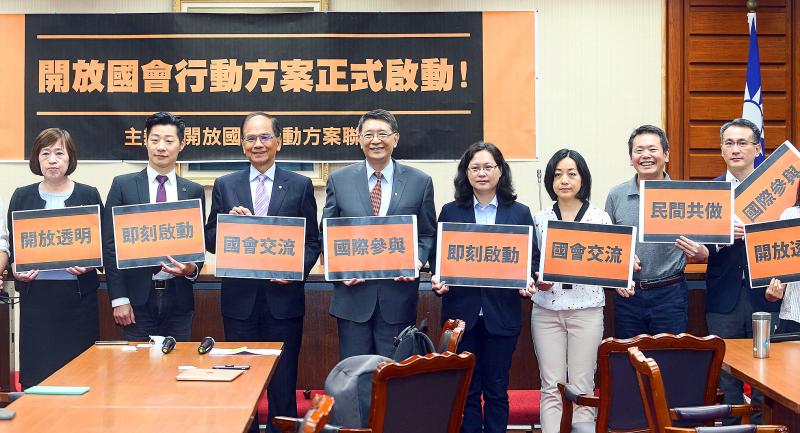Independent Legislator Freddy Lim (林昶佐) yesterday in Taipei launched the Open Parliament Partnership Action Plan in a bid to promote transparency in the Legislative Yuan, increase exchanges with Open Government Partnership (OGP) member states and raise the nation’s international profile.
Citing as examples a “mask map” jointly designed by Minister Without Portfolio Audrey Tang (唐鳳) and members of the public, and Citizen’s Congress Watch’s routine perusal of recordings of legislative question-and-answer sessions on Parliamentary TV to rate lawmakers’ performance, Lim told a news conference at the Legislative Yuan that the public sector could team up with the private sector to use similar technologies to conduct topic-based analyses using data made available by the legislature, which he said would help usher in a new era of democracy.
This would bring the legislature in line with the targets set by the OGP — whose annual meetings are attended by himself and Tang — boosting the nation’s chances of securing OGP membership, he said.

Photo: CNA
China, with its opaque government, is not very influential in the partnership and cannot ostracize the nation forever, Lim added.
Legislative Speaker You Si-kun (游錫堃) said that he supports the plan.
The Open Parliament e-Network is a spinoff of the OGP and aims to promote openness in parliaments, allow easy access to parliamentary data and digitize parliaments, and the nation should work toward these goals, he said.
The goals conform to his own ideals for the Legislative Yuan: to improve its operations and functions, consolidate democratic values and engage with parliaments of other nations, You said.
An open Legislative Yuan would further boost the nation’s international visibility and status, which would contribute to the goal of making Taiwan a “normalized” nation, he said.
Members of the Chinese Nationalist Party (KMT), the New Power Party and the Taiwan People’s Party also attended the launch ceremony.
The government should be transparent regarding its decisionmaking process, from cross-caucus talks to appointments and nominations of officials, KMT caucus whip Lin Wei-chou (林為洲) said, adding that the only information that the government should not disclose are state secrets.
The more open and transparent information is, the more developed a democratic nation’s society is, he said.
Although Taiwan is not a member of the OGP, Tang last year at the group’s summit said that the government would draw up an open government action plan on its own initiative, National Development Council Deputy Minister Kao Shien-quei (高仙桂) said.
The plan seeks to release more government data, boost civic participation in policymaking, introduce a mechanism for dialogue between ethnic groups, crack down on money laundering and promote a clean government, she said, adding that practicing these principles would boost the nation’s international space.

Taiwan is stepping up plans to create self-sufficient supply chains for combat drones and increase foreign orders from the US to counter China’s numerical superiority, a defense official said on Saturday. Commenting on condition of anonymity, the official said the nation’s armed forces are in agreement with US Admiral Samuel Paparo’s assessment that Taiwan’s military must be prepared to turn the nation’s waters into a “hellscape” for the Chinese People’s Liberation Army (PLA). Paparo, the commander of the US Indo-Pacific Command, reiterated the concept during a Congressional hearing in Washington on Wednesday. He first coined the term in a security conference last

Prosecutors today declined to say who was questioned regarding alleged forgery on petitions to recall Democratic Progressive Party (DPP) legislators, after Chinese-language media earlier reported that members of the Chinese Nationalist Party (KMT) Youth League were brought in for questioning. The Ministry of Justice Investigation Bureau confirmed that two people had been questioned, but did not disclose any further information about the ongoing investigation. KMT Youth League members Lee Hsiao-liang (李孝亮) and Liu Szu-yin (劉思吟) — who are leading the effort to recall DPP caucus chief executive Rosalia Wu (吳思瑤) and Legislator Wu Pei-yi (吳沛憶) — both posted on Facebook saying: “I

The Ministry of Economic Affairs has fined Taobao NT$1.2 million (US$36,912) for advertisements that exceed its approved business scope, requiring the Chinese e-commerce platform to make corrections in the first half of this year or its license may be revoked. Lawmakers have called for stricter enforcement of Chinese e-commerce platforms and measures to prevent China from laundering its goods through Taiwan in response to US President Donald Trump’s heavy tariffs on China. The Legislative Yuan’s Finance Committee met today to discuss policies to prevent China from dumping goods in Taiwan, inviting government agencies to report. Democratic Progressive Party Legislator Kuo Kuo-wen (郭國文) said

The Ministry of Economic Affairs has fined Taobao NT$1.2 million (US$36,900) for advertisements that exceeded its approved business scope and ordered the Chinese e-commerce platform to make corrections in the first half of this year or its license would be revoked. Lawmakers have called for stricter supervision of Chinese e-commerce platforms and more stringent measures to prevent China from laundering its goods through Taiwan as US President Donald Trump’s administration cracks down on origin laundering. The legislature’s Finance Committee yesterday met to discuss policies to prevent China from dumping goods in Taiwan, inviting government agencies to report on the matter. Democratic Progressive Party